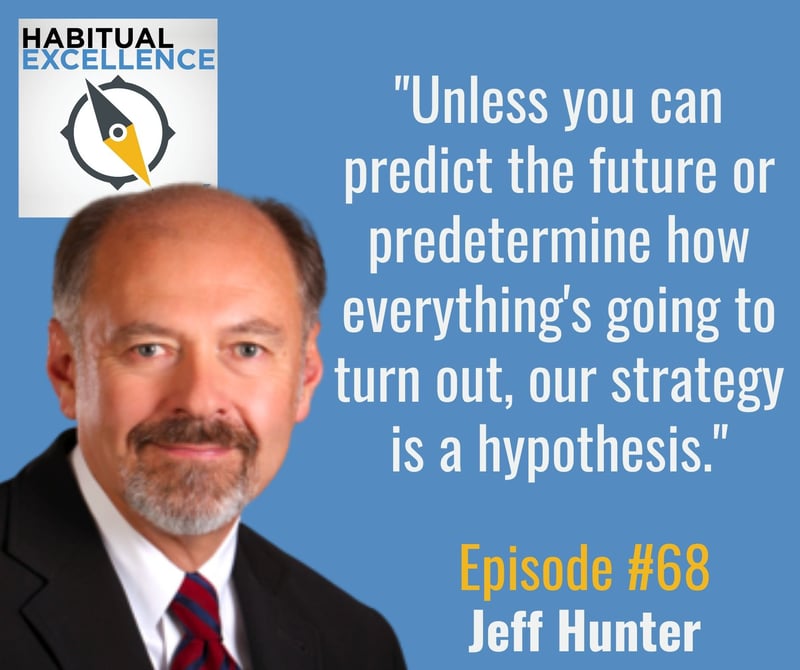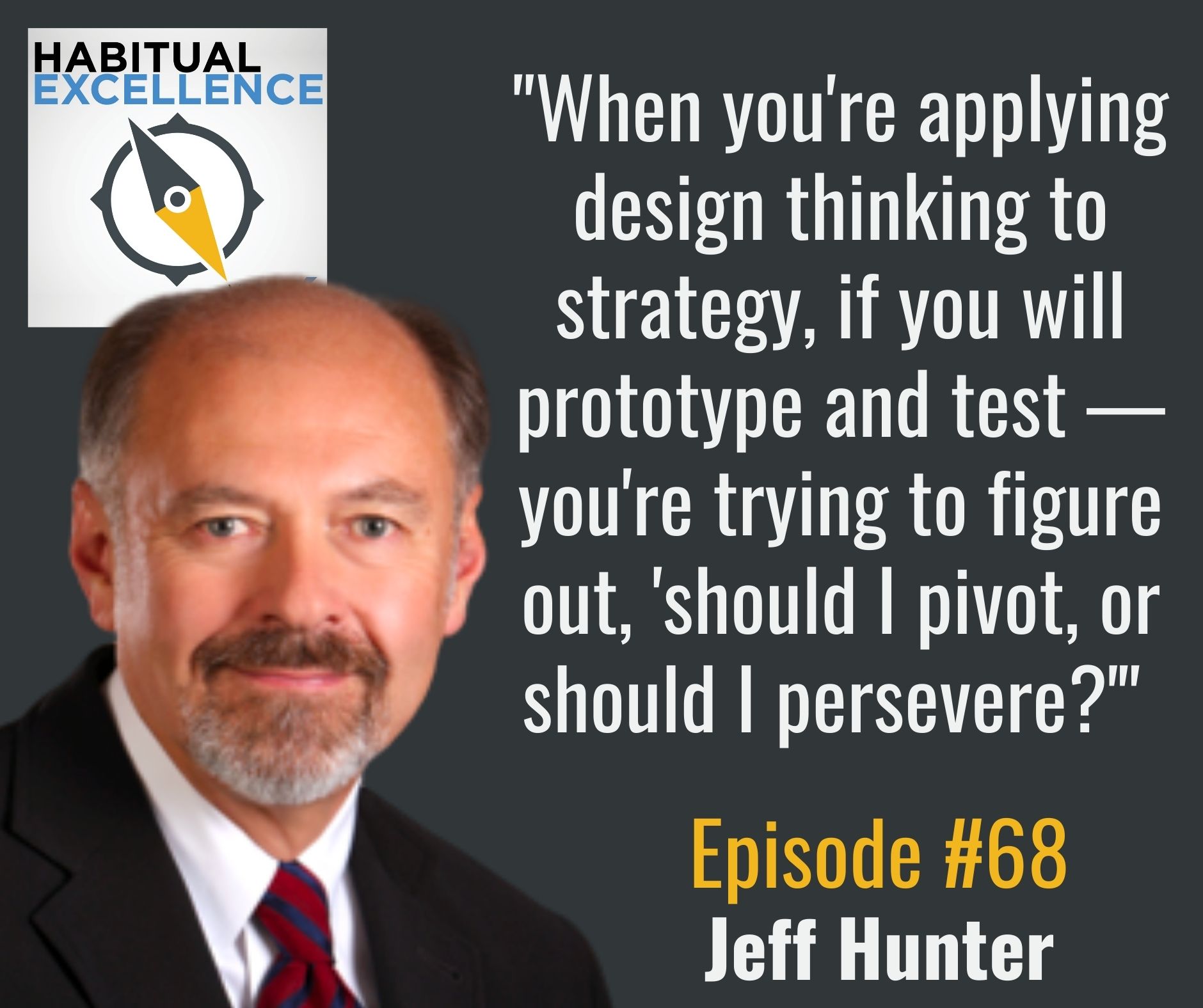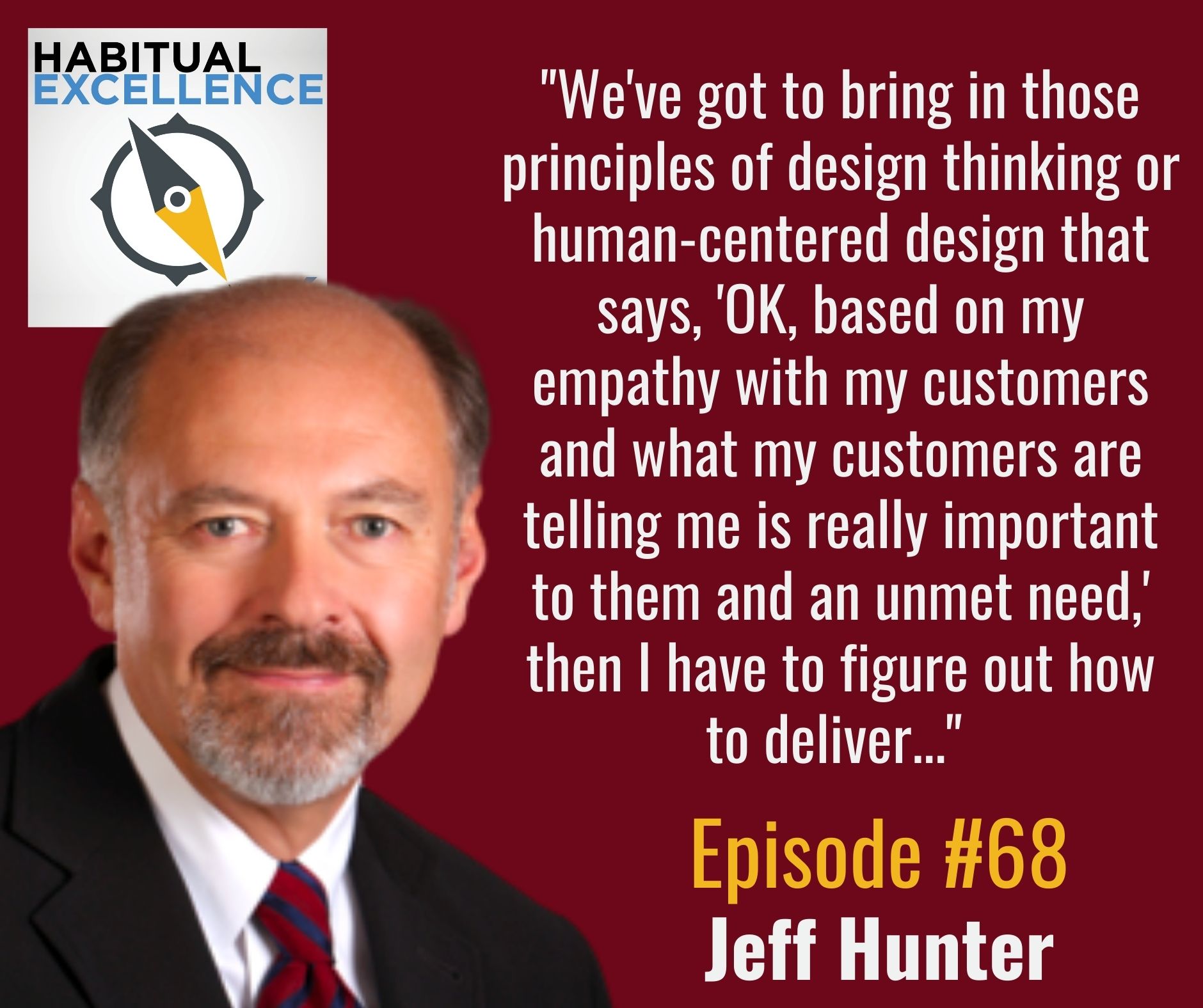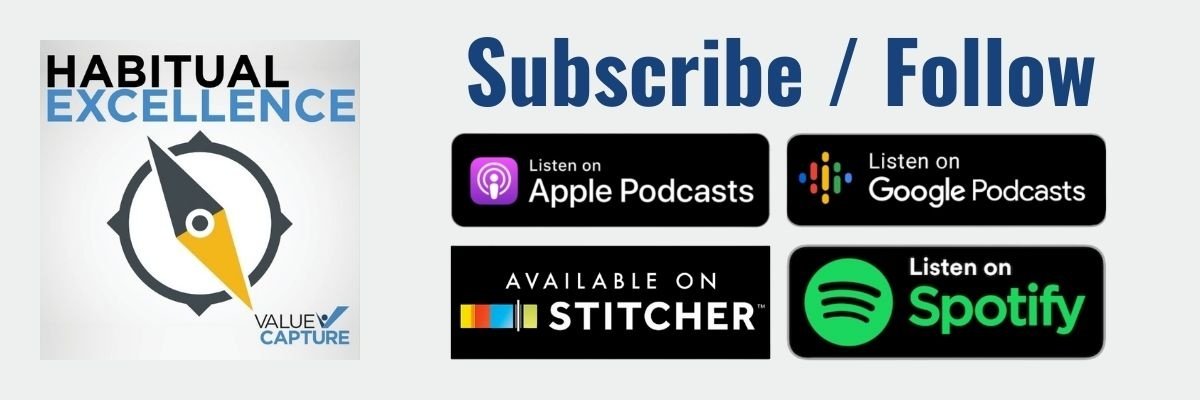Listen:
Scroll down for a transcript, video, how to subscribe, and more
Episode Synopsis:
Welcome to Episode #68 of Habitual Excellence, presented by Value Capture.

Joining us today as our guest is Jeff Hunter, the President of Jeff Hunter Strategy.
He is the author of Patient-Centered Strategy: A Learning System for Better Care, published by Catalysis in 2018.
Jeff is on the faculty of Catalysis, and the Donald J. Schneider School of Business and Economics at St. Norbert College.
From 1991 until his retirement in 2015 he was the Senior Vice President, Strategy and Marketing for ThedaCare, a healthcare system based in Appleton, Wisconsin.
Jeff received his B.S. in Economics from the University of Detroit and his M.A. in Health Services Administration from the University of Wisconsin-Madison.
In today's episode, Jeff talks with host Mark Graban, about topics and questions including:
- As we shift to a new mode of the pandemic — living with Covid — What are you hearing from healthcare leaders about what’s required next?
- Hearing a lot of “Thank God I had the Lean management system” for the pandemic - discipline, standard work
- How do you define strategy? Not just a binder…
- Strategy plan vs. strategy?
- Differentiation — what differentiates us? Not imitating
- From budgeting to financial forecasting (beyond budgeting)
- Strategy plan or hypothesis? - PDSA cycles — Roadmap or GPS?
- Strategy formulation and strategy deployment??
- Lot of choices that have to be made? How to make better choices? Better choices more quickly?
- How do you define a management system, a strategic management system? What makes it really work?
- Reinvigorating the management system, but learning from the first time
Click to visit the main Habitual Excellence podcast page.
Video:
Quotes:



Subscribe:
To make sure you don't miss an episode, be sure to subscribe today! Please rate and review the podcast.
Automated Transcript:
Mark Graban (2s):
Welcome to Habitual Excellence presented by Value Capture. This podcast, and our firm, is all about helping you and your organization. Achieve Habitual Excellence. Be a one unifying focus, one value based structure and one performance system. In other words, it's about helping you capture dramatically more value through achieving perfect care and perfect safety for patients and staff. To learn more about Value Capture and our services visit www.valuecapturellc.com. Well, hi everybody. Welcome to Habitual Excellence. I'm Mark Graban and our guest today is Jeff Hunter. He is the president of his firm, Jeff Hunter Strategy.
Mark Graban (46s):
You can learn more about Jeff and his work online jeffhunterstrategy.com. Jeff is the author of the book Patient Centered Strategy: A Learning System for Better Care that was published back in 2018 by Catalysis, our friends and partners there at Catalysis. Jeff is on the faculty of catalysis as well as the Donald J. Schneider School of Business and Economics at St. Norbert College. Before Jeff started working independently from 1991 until 2015, he was the senior vice president strategy and marketing for theta care or healthcare system based in Appleton, Wisconsin.
Mark Graban (1m 26s):
Jeff has a BS in economics from the University of Detroit and an MA in health services administration from the University of Wisconsin Madison. So Jeff, welcome to the podcast. How are you?
Jeff Hunter (1m 37s):
I'm great, Mark. Good to see you again.
Mark Graban (1m 39s):
Yeah, it's good to see you. It's I'm excited to hear your thoughts and perspectives here today. I'll give another shout out to the book. Patient Centered Strategy is it's something I highly recommend and, and Jeff, with his approach to strategy thinking and management and action has been helpful, continues to be helpful to us here at Value Capture. So thank you. Thank you again for all of that Jeff.
Jeff Hunter (2m 6s):
Well, thanks. You know, it really is built on what you folks and everyone else has taught me. All I've been trying to do is capture what seems to be working and get it into a system. So it's, this is, this is a shout out to everybody on the call.
Mark Graban (2m 24s):
Yep. So yeah, Jeff, think, you know, the main question to get things, get the conversation started today, you know, as, as we sort of progressed from pandemic to endemic as we are, you know, figuring out how, how to live with COVID and, and what the implications are of that, you know, you, you talked to a lot of healthcare leaders, what are you hearing from them about what's required now what's required next?
Jeff Hunter (2m 52s):
Yeah, I mean, for so long, what they were telling me is I can't even get people's attention on strategy. It's if you bring it up, it's almost like you're walking into a hostile environment, so to speak because people are just really consumed by trying to get through COVID. And so, again, as, as now, things as we're getting into a new reality, maybe a couple of things, one is I hear them saying I'm really thankful that we had a management system or an operating system because that's what helped us get through COVID. I mean, the, the discipline, the standard work that compelled leaders at each level in the organization to get together under conditions of uncertainty and try to figure out what to do and how quickly they had to study and adjust, study and adjust that it was that management system, that operating system that I think enabled them, you know, the, again, the, the they're thankful they had it, but now that they are moving forward on this, they're realizing that they, they're not going to go back to the way it was.
Jeff Hunter (4m 2s):
This really is a, a new reality. And they're, they're saying that, you know, the staffing crisis really existed before this, it just was exacerbated essentially, and it's not going to be get solved by throwing money at it. It's going to take fundamental care redesign. So what I'm getting is Paul now to reinvigorate strategic management, strategic planning, and strategy deployment that it's, it's becoming necessary again.
Mark Graban (4m 34s):
Yeah. And then I've, I've heard that I've heard a similar comment from a lot of organizations that I've talked to, that they were thankful for the management system. They were thankful for the engagement with staff and continuous improvement, or, you know, the engagement in developing new processes when needed, you know, I think organizations that had already developed better problem solving skills were better equipped to face that big, huge problem called COVID.
Jeff Hunter (5m 4s):
I think they've gotten more comfortable with the idea of being nimble and agile. I've seen more organizations now shift from the budgeting mentality to the financial forecasting mentality, you know, beyond budgeting, which again, I was introduced to by, by Steve player, another friend of ours and, and this way of managing strategy is very consistent, very consistent. And so, you know, early in my career, I learned to partner with our finance team. I learned our partner with our organizational development team. It was really about how quickly we could plan, do study and adjust.
Mark Graban (5m 50s):
And so when you talk about strategy, like maybe, you know, it would be good to hear some of your definitions for people. Cause I, I think you have a view of strategy that might be different than what a lot of organizations traditionally do. So how, how do you define strategy? It's not just a, it's not the stick binder sitting on a shelf, right?
Jeff Hunter (6m 12s):
No, cause that just, it never did last long, but it's just become irrelevant. Now we have to have a plan. We have to have it in writing their target audiences that expect when the joint commission comes wrong, they want to see your strategic plans. So sure. We did write up the strategic plan, but, but strategic strategy, number one, that's about what are we going to do uniquely compared to others that is relevant to our customers? So the essence of strategy is around differentiation and that's around process based differentiation for a long time. Because again, I spent my career in healthcare or we were used to imitation everybody's strategy.
Jeff Hunter (6m 56s):
You had a tendency to look alike. We all bought the same technology. We built the same buildings. We try to hire the same people. We were all doing the same thing. And so it was imitation, not differentiation. And it also was about assets rather than what I understand strategy to be now. And that is how are we going to develop our differentiation by how we create a different experience? That's all processed based. Sure. You got to have assets, but then it's really based in process. So that's the essence of strategy. Now we have to develop this under again, conditions of uncertainty and competition. And as fast as the world is moving, we can't take, create strategic planning.
Jeff Hunter (7m 39s):
Like at any event, it's a capability, it's a capability of how we manage our vision, how we manage our strategy with focus and agility big, unless there's someone on this call who can predict the future or predetermined how everything's going to turn out our strategy as a hypothesis. And so we've got to bring in those principles of design thinking or human centered design that says, okay, based on my empathy with my customers and what my customers are telling me is really important to them and an unmet need. Then I need to try to figure out how I think I'm going to meet that need, but that's a hypothesis.
Jeff Hunter (8m 25s):
So then I've got a prototype and test and prototype and test.
Mark Graban (8m 30s):
So I'd like to hear more about the opportunity for healthcare organizations to differentiate. So let's say if I'm in a major market with many competitors, we probably have the same technology, similar skills and education amongst our staff. What are some of the key factors then that, that differentiate in a way that's, that's good for the organization and the long-term?
Jeff Hunter (8m 54s):
Yeah, it is hard for a large legacy based healthcare organizations. I mean, again, I was in one, we're used to being all things to all people in a geographic radius, cattle like our, our competitors. But you know, what, what you miss frequently is the new entrants that are coming into the marketplace. If you will, the niche players that, that are impacting our business and, and leaving us with the financially difficult, but very necessary services that we need to provide. So we have got to, again, go back to our customers like these new entrants, do these new entrants are very good at understanding customers.
Jeff Hunter (9m 39s):
They're very good at relationship management. They're more skilled at that when we, then we have storage, we have been. And so what we do is we, we like to bring in, again, I'm a big fan of connecting strategy with design thinking. It's how do we really deeply understand the needs of those customers? And then engineer a different value proposition for segments of customers again, because we're so used to being all things to all people in a radius we're, we're not that good at segmentation and targeting as, as others would be. So that's one skill, get, get the segmentation and the targeting, and then figure out what we're going to do differently for different target audiences.
Jeff Hunter (10m 22s):
One of the basics,
Mark Graban (10m 24s):
That's a great point about, you know, startups, new entrance. I mean, I think there are times when I've seen a legacy health system be innovative in designing a differentiating process, like one example, this is going back at least a decade. I had the chance to visit in your neighboring state and Minnesota, Park Nicolet Health System had a cancer center where the design goal I thought was very powerful where care comes to you. So the patient, instead of being expected to go from area to area, building the building, like everything, but radiation treatment because of the specialized equipment, like everything, but that happened in the same room and you can still find the videos on YouTube.
Mark Graban (11m 8s):
It became a marketing slogan of showing like you're going to get excellent care, but kind of wrapped around a, a better experience.
Jeff Hunter (11m 20s):
Yeah. Well, and, and the experience, again, it took process engineering to do that when we really got to deeply understand, for example, our sickest patients that were, let's just say cancer patients, patients with significant heart disease. What they were telling us was that the challenge wasn't necessarily within our vertical silos, our operating units, the problem they were having was they had a goal across our operating units horizontally, if you will. And that's where we had a tendency to let them down. So we had to figure out the process of how we were able to manage the patient relationships horizontally across the system.
Jeff Hunter (12m 2s):
If we were going to break through with the patients, everybody was trying to figure out how many more vertical silos to build and what to augment, but the real key to what the patient needed was horizontal. And that was all process that didn't, you know, the technology was, was minor if you will.
Mark Graban (12m 20s):
Yeah. And I love what you said a couple of minutes ago about the difference between having a strategy plan, which seems to then lay out the sort of all-knowing linear future of going and executing said, plan versus having a hypothesis. And you, you talked about a plan, do study adjust cycles. And like my, my, my favorite kind of parallel that, that I heard from somebody recently was kind of thinking how dated it is. We talk about a roadmap in a lot of cases, we talk about a roadmap for lean transformation or a roadmap for developing a new service line.
Mark Graban (13m 1s):
And, and some of the challenges, it shouldn't. We think of it more as the GPS, because I think if I'm going to go drive across town here in Los Angeles, the GPS will have an initial hypothesis of the best routes. And then as traffic conditions change, we all know that GPS will recalculate and say like, well, now we think we need to go this route. Is there a parallel to thinking about strategy as we move forward?
Jeff Hunter (13m 28s):
Oh, absolutely. One of the diagrams I use a lot, it makes it look like, like you're, you're hiking and you're hiking in the mountains and you know, ultimately where you want to go. But as you get across the one mount, you don't exactly know what's going to be there. It may not exactly be what it's like on the map. You don't know exactly what the conditions are. You don't know the weather moving in. And so you have to get yourself from where you are to the next target state. And then you have to, if you will reorient and look again, where is that vision? The division change. Because if you believe at all in systems thinking, when we took an action, we caused a lot of other reactions, some of which were unanticipated.
Jeff Hunter (14m 10s):
And so we have to learn from what worked with customers. We have to learn what competitors did in reaction. We have to learn what's going on around us. That caused what we thought was the opportunity at all. We have to reorient ourselves to that and ask ourselves, okay, now what's the next target state we're going to get to. So that's, I love that example of, of the GPS. I mean, we really know what the vision is. We just cannot will ourselves there. We have to get ourselves there, a one target state at a time and we have to start, you know, figuring out collectively what is right. We shouldn't be arguing who is right, because there, they have more knowledge than others.
Jeff Hunter (14m 50s):
That's how we engage the organization in organizational learning to figure out what is right.
Mark Graban (14m 57s):
And then when you're talking about engaging the organization, like how I'd be curious to hear your thoughts on the flow from a strategy plan or let's call it the strategy hypothesis to then strategy deployment throughout the organization. Why do we need to take that next step toward deployment? What does that mean to you?
Jeff Hunter (15m 15s):
Well, and, and it is all part of the same learning cycle. I've learned it, not separate strategy formulation from strategy deployment. And then if things don't work out the way I thought I'm going to just blame it on the people deploying strategy, because what happened is something happened that I, based on assumption that I made that did not turn out to be true. So I see it strategy formulation and strategy deployment as part of the same learning cycle. And the information does go both ways. And so I will be acting based on your formulating strategy based on intuition and facts, learn at the front lines because they're the ones spotting the unmet needs of patients and giving me a hint.
Jeff Hunter (16m 1s):
And then I'm out, you know, again, I'm looking at the overall marketplace and then so we're formulating hypotheses, or we have to test them with patients who is in the best position to be able to see what's working and what isn't the folks at the front line. And so it really is a, a flow of information back and forth a top and bottom. I do use an example in the book of where we wanted to solve a problem with one of our service lines. And so we did add some capability in one of our service lines. It worked out really well. The problem was it caused an overburden to the frontline staff in the intensive care unit.
Jeff Hunter (16m 44s):
They were running out of beds and well, they did everything they could do to try to level load. And every, they try to escalate the problem up and up, and they did, they solved what they could at their level, but ultimately it came back to the leadership team and we had to change some things to be able to help them with the capacity issue that they were facing. So it's, it's, the information has got to flow both ways.
Mark Graban (17m 8s):
And then with that information becomes that opportunity to adjust. If that information is part of the study, then, then, then we, we adjust. We w we re reroute, I guess, to use the language of GT.
Jeff Hunter (17m 22s):
Yeah. Well, one story I like to tell is a long time ago, and this was before I was exposed to lean thinking, we went down to the Disney experience. If we will, Donna, where we're to be learning customer service, that's what we were supposed to be learning at the time. What really struck me was they would bring in folks from the front lines, who would say, you know what, I'm just doing my job on the frontline. I tend to notice the pain points that our customers have. And so I'll try something. And then if I think it's working, then we'll, if you will, in our terminology, spread it, you know, and, and it's, it was, it's my understanding that that is how Disney figured out how to put up signs to told you how far you are from the front of the line.
Jeff Hunter (18m 6s):
It was not the senior VP of marketing doing cutting-edge market research. That figured that out.
Mark Graban (18m 13s):
That's great...
Jeff Hunter (18m 13s):
On the other hand is probably not the frontline people in Los Angeles who said, we really ought to build one of these in Orlando. So again, it's different, it's different skills, different levels, but you've got to work.
Mark Graban (18m 26s):
Yeah. One of the things I'm curious about, you know, of all the choices that have to be made, allocation of time, resources, selecting projects, what do we spend money on? How, how does, how does an effective strategy deployment process help an organization make better decisions, maybe even better decisions more quickly?
Jeff Hunter (18m 52s):
Well, and the situation is hard. And then it's hard in healthcare organizations where like, we're like universities, we fall into a classification of organizations that they call professional organizations. And that's where autonomy, professional autonomy is really important. A lot of people think they have veto power and a lot of people do have power. And so they want to see themselves at the front of the line. They want to see themselves in the strategic plan. And so that's how we used to wind up with planning events that listed all the 250 things we might have to do in the next three to five years. Because if you didn't see yourself in that three- to five-year plan, you thought your idea was going to get lost for the next three to five years.
Jeff Hunter (19m 36s):
Well, it's, it's still difficult to make choices of what to focus on now, but, but the point is, what are we going to focus on now? Because if we can get that done, imagine what we'll learn, and then we can focus on the next few things. And so what we're trying to do is if you will accelerate the throughput of strategic ideas, we're trying to manage with focus and agility, those ideas that are most important to us at this point in time. And once, and once we are able to build new processes there and stabilize them, then they, they become what we do. They become operational effectiveness. Then we can bring on new ideas.
Jeff Hunter (20m 16s):
The point is to try to accelerate that flow from new idea through work and process on to, Hey, we got it done. And now we're, we're in the daily improvement. Yes. Is what are we going to focus on now? It's not, again, it's not, your idea is a bad idea, or we are accepting new ideas for three more years.
Mark Graban (20m 38s):
Yeah. And I remember, you know, back in the day, John Toussaint would kind of walk us through that process. Then I know you were a part of, it's not just saying yes, no, but yes, no, or not now.
Jeff Hunter (20m 51s):
Right? Yeah. And there'll be able to really keep the idea there. There's nothing wrong with applying a little eight, a three thinking or a little PDSA thinking to what they think is a problem or opportunity. But it's just like, when you're doing operational effectiveness at the frontline, they can't solve everything today. They have to harvest the ideas and then figure out which ones they're going to solve now. And so it's the same fundamental thinking that you elevate to the organizational level. And once again, I think the people should have confidence that they can do this because that's what they did to manage through COVID they figured out what was most important now, and they try to escalate, or if you will accelerate how quickly they learn.
Mark Graban (21m 45s):
Well. So on that topic of management, maybe a final question for HF, how do you define a management system or maybe even better than that, a strategic management system? What, what really makes that work?
Jeff Hunter (21m 58s):
Right? It's it is the, the it's a capability. So it is a system with tools. It includes like any other component of your overall management system. It includes a leader standard work. It includes visual management. I see it as a subset of your overall operating system. If you think about, I like the shingle model, I like align, enable improve. It is a system and it's a principle based system with tools by which you aligned. And so that's, that's how I see it.
Jeff Hunter (22m 40s):
It's a system, it's a capability that enables your organization quickly and be aligned around.
Mark Graban (22m 49s):
Yeah. And, you know, I think maybe as a final, final question back to this, back to the, the original question about not going back to the way we used to do it as, as organizations are recovering or trying to figure out how to move forward, what, what do you see them doing? What's what should they be doing if they need to reinvigorate their management system, if they, if their, if their focus or attention has been taken away from that.
Jeff Hunter (23m 16s):
Yeah. I, I think as what you folks teach people and that, and that's, let's start with, if you will, a model itself. So, you know, this way of thinking around strategy, where you try to deeply understand what you're trying to solve for, what is the customer pulling for? What do you think is the solution? How do you prototype and test a solution, try that in a service line, try it in an operating unit, a geographic, something that you're trying to, rather than trying to convince the entire organization at the same time, how to think differently. I would try this different. Secondly, again, I was, I was really influenced by your measures of success, because what was so important was figuring out what to measure, what's the right measure, but then measuring it the right way so that we are learning.
Jeff Hunter (24m 14s):
Because when you're applying design thinking to strategy, you're doing, you know, if you will prototype and test prototype and test. And so you're trying to figure out, should I pivot, or should I persevere? And your ability to be able to distinguish signal from noise, which you've taught me is really important to determining if you should pivot or persevere. So I would just get, I would get small and narrow and I would get scientific to figure out, you know, how again, do we engage people and figuring out what, what is right.
Mark Graban (24m 53s):
Well, it's well said, and thank you for the mention of the book. I appreciate that. So I'm glad you've found that useful, but our, our guest today, again, has been Jeff Hunter, his website is JeffHunterStrategy.com. And I'm again, I'm going to throw the recommendation back to Jeff's book, Patient Centered Strategy: A Learning System for Better Care. And that, that seems like a key word there, learning, learning system.
Jeff Hunter (25m 21s):
Great to see you Mark. Look forward to seeing you in person hopefully soon.
Mark Graban (25m 25s):
Yep. Well, thank you. Thanks, Jeff. And yeah, hopefully at the Lean Healthcare Transformation Summit in June,
Jeff Hunter (25m 32s):
I will unfortunately be in, well, unfortunately, unfortunately I will be in Sweden at a wedding that I didn't schedule it, but they did. And I, I have to be there, but I'm going to be doing a pre summit conference for Catalysis and then be following up with you folks right afterwards.
Mark Graban (25m 50s):
Okay. Well, I hope people will check out the summit, Lean Healthcare Transformation Summit, and certainly safe travels to Jeff. We'll we'll see you there next time or some other times.
Jeff Hunter (26m 0s):
Thanks man.
Mark Graban (26m 1s):
Thanks Jeff. Thanks for listening to Habitual Excellence presented by Value Capture. We hope you'll subscribe to the podcast and please also rate and review it in your favorite podcast, directory or app. To learn more about Value Capture and how we can help your organization on this journey to Habitual Excellence, visit our website www.valuecapturellc.com.

Written by Mark Graban
Mark Graban has served healthcare clients since 2005. Mark is internationally recognized as a leading author and speaker on Lean healthcare. His latest book is "The Mistakes That Make Us: Cultivating a Culture of Learning and Innovation."


Submit a comment